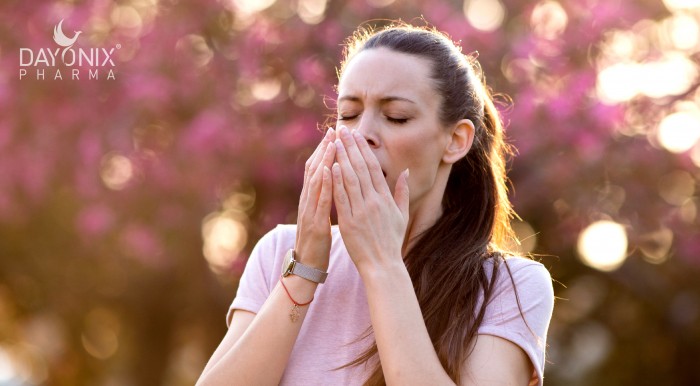
Sneezing again? Is it allergy or cold?
March 14, 2020Sneezing, allergy or cold?
There is a myth which says sneezing three times in a row is a sign of good luck! But what does sneezing actually mean? Is your allergy back again, or is it just a sign alarming you of catching a cold?
Sneezing is a protective reflex of the body’s respiratory system. It is basically triggered by stimulation of your nasal cavity. Any physical or chemical irritant, attacking nasal mucosa, can lead to sneezing. Your nasal tissue is rich in neural sensory endings, originated from a cranial nerve called trigeminal. By this nerve branches, the stimuli reaches the sneezing center in the brain. Then the second part of this sneezing cascade begins. You close your eyes, take a deep breath, and then exhale it with pressure. This gives rise to an explosive exit of air through the mouth and nose, washing out mucosal debris and irritants.
What are the main causes of sneezing?
- Rhinitis
If the outer layer of the tissue covering the nasal cavity becomes inflamed, it is called rhinitis. There are different reasons which will lead to inflammation in your nose. But all of them share mostly same kind of symptoms. These symptoms are as follows:
- Nasal congestion (stuffed nose)
- Rhinorrhea (runny nose)
- Sneezing
- Nasal pruritus (itchy nose)
So what are the different types of rhinitis?
- Allergic rhinitis:
This is actually a hypersensitivity reaction caused by allergens. Allergen is a substance which can trigger your immune system to start an allergic reaction. The allergic reaction will defend your body by rejecting the allergen. Some of the most popular allergens which can stimulate your immune system are tree or plant pollen, spices, dust mites, pet hair, mould. It is not uncommon for a person with no previous history of allergy, to suddenly become allergic. Also one may have had allergies for several years, but not anymore. With spring coming, there is a good chance you may experience allergic rhinitis. It is good to know that it is mostly featured by sneezing and itchy nose.
- Infectious rhinitis:
Mostly caused by viruses, infectious rhinitis can also happen by fungal or bacterial infections in patients with risk factors. An individual who has immunodeficiency caused by diabetes, HIV, immunosuppressive drugs, chemotherapy, or is in ICU for a long time is in most risk for viral and especially non viral rhinitis.
In more than 50% of cases, the cause of the common cold is a virus called rhinovirus. Rhinovirus is responsible for the nasal symptoms of infectious rhinitis, mostly sneezing, and stuffed nose. Infectious rhinitis also happens due to influenza virus, but it is a minor feature.
- Nonallergic noninfectious rhinitis
Not all the cases of rhinitis are due to common cold or allergy. There are some conditions with an unknown etiology which may lead to sneezing. For example in occupational rhinitis, dense smoke, cold air, air fresheners, formaldehyde and other chemical irritants in the work place can lead to the condition. There are also other types of rhinitis which are out of this discussion.
- Photic sneeze reflex
Some people happen to sneeze when looking at the sun. This maybe a mix up between pupillary light reflex which leads to contraction of your pupils in light and sneezing reflex.
- Physical stimulants
Physical stimulation of trigeminal nerve activates sneezing reflex. Pulling hair or eyebrow are two examples of these stimulants.
- Snatiation reflex
Combining sneeze and satiation, snatiation sneezing mostly happens after an excessive nutrition. One will sneeze unstoppable, with a full stomach!
- Sexual ideation or orgasm
There have been some reports with men and women complaining of multiple unstoppable sneezing after orgasm or sexual idealization. This may be because of some same tissue found in both nasal and genital area.
- Psychogenic sneezing
Psychogenic intractable sneezing occurs mainly in adolescent girls for which a cause may not be found. Usually psychotherapy and relaxation exercises will help the patient.
So is sneezing a good sign or a bad one?
Actually as it is part of our protection reflexes, it is a good sign. It alerts you that something is wrong in your body. It can be an allergic reaction, an infection or even a psychiatric problem. But the point is that sneezing can make us uncomfortable if it lasts too long or even if it happens regularly. So how can we stop it?
First of all make sure what the cause is. It is better to rule out the most common causes first. This includes allergic rhinitis and common cold. So set an appointment with your GP. Find out the cause and then start remedies as prescribed.
Then you have to be sure you are sneezing right! Yes it is important to sneeze the right way, as it washes out your respiratory system and it will contain a lot of microorganisms. So too sneeze correctly, you should sneeze in a tissue then threw it away. If there is no tissue available, then sneeze in your upper sleeve, not your hands!
After all it is always important to take good care of your immune system in order to protect yourself from possible threats. One of the easiest and simplest ways of self-care is being sure that your body gets enough vitamins and minerals especially zinc and iron ! Then do not forget your daily treat for a happier life!
Keywords : diet, health, irondeficiency, ironsupplement, women